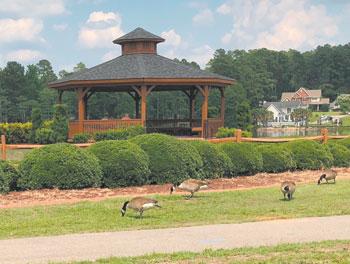 As a youngster, Dr. Kent Dean remembers the hours he spent enjoying various forms of recreation on Hope Mills Lake. Now that the lake has finally returned, he understands there’s a strong desire for local people to swim and enjoy the opportunities for fun the lake offers.
As a youngster, Dr. Kent Dean remembers the hours he spent enjoying various forms of recreation on Hope Mills Lake. Now that the lake has finally returned, he understands there’s a strong desire for local people to swim and enjoy the opportunities for fun the lake offers.
At the same time, as a veterinarian who’s practiced in Hope Mills for 31 years, he knows the town is wise to prohibit swimming in the lake until something can be done to lower the amount of fecal material that tests of the lake water have shown to be present.
Dean said there are a lot of intestinal, and in some cases respiratory, infections that can be transmitted by goose droppings.
His research found that a typical goose eats as much as four pounds of grass per day and can leave upward of a pound and a half to three pounds of droppings behind in that same period.
That means a flock of 20 or 30 geese in one location like the lake could produce a maximum close to 100 pounds of droppings per day.
That’s part of the reason the lake has tested for high levels of fecal waste.
“If it’s in the water, you can get it,’’ Dean said of the various illnesses that can be transmitted by goose droppings. Infections can come from a number of sources, he said, including E. coli and a Protozoa parasite called giardia.
Dean said giardia live in the intestinal tract of dogs and birds. “We can ingest it and it can cause bad diarrhea,’’ he said.
While people in good health are less likely to be infected by something in goose droppings, Dean said there’s always a chance. The odds increase if someone has a compromised immune system.
While people could become infected if the organisms enter an open wound on a person’s body, Dean said the most likely way is by swallowing the bacteria or breathing it in.
One disease the geese can transmit is called psittacosis, which appears in humans as a flu-like ailment that includes pneumonia.
Children, whose immune systems aren’t fully developed, are at risk, along with people who suffer from certain types of diseases or are undergoing chemotherapy.
“Anybody that’s got an infection where their immune system isn’t functioning well, they’re more susceptible for sure,’’ Dean said.
Dean said he drove by the lake recently and saw geese nearby. He is concerned about what options the town has to remove them.
“You can’t shoot or poison them,’’ Dean said. “They are protected.’’
Dean said there’s no practical way to sanitize the lake like a giant swimming pool.
One feasible option could be to hire an outside company to chase the geese away.
“Golf courses have a big problem (with geese),’’ Dean said. “There are people you can hire to bring in border collies and pester them enough to leave.’’
Hope Mills Mayor Jackie Warner said the town hasn’t reached a decision on what to do about the ongoing problem with geese and other water fowl polluting the lake. A few people have continued to go swimming despite the warnings about the danger. She said town officials could increase police presence at the lake to discourage swimmers. They already have signs posted asking people not to feed the geese so they hopefully won’t congregate there.
Warner hopes people will cooperate because town officials want to do everything possible to avoid imposing any real penalties for people who go into the water.
“It’s kind of sad,’’ Dean said. “It would be nice if it wasn’t like that, where animals and people could use it together.’’

 How to resolve AdBlock issue?
How to resolve AdBlock issue? 









